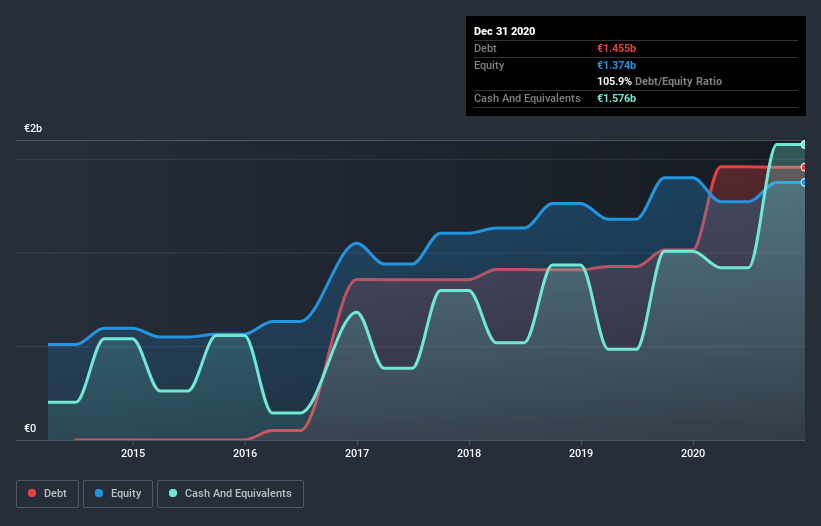Howard Marks put it nicely when he said that, rather than worrying about share price volatility, 'The possibility of permanent loss is the risk I worry about... and every practical investor I know worries about.' It's only natural to consider a company's balance sheet when you examine how risky it is, since debt is often involved when a business collapses. We can see that Fnac Darty SA (EPA:FNAC) does use debt in its business. But is this debt a concern to shareholders?
When Is Debt A Problem?
Generally speaking, debt only becomes a real problem when a company can't easily pay it off, either by raising capital or with its own cash flow. Part and parcel of capitalism is the process of 'creative destruction' where failed businesses are mercilessly liquidated by their bankers. However, a more usual (but still expensive) situation is where a company must dilute shareholders at a cheap share price simply to get debt under control. Of course, the upside of debt is that it often represents cheap capital, especially when it replaces dilution in a company with the ability to reinvest at high rates of return. When we think about a company's use of debt, we first look at cash and debt together.
View our latest analysis for Fnac Darty
What Is Fnac Darty's Debt?
You can click the graphic below for the historical numbers, but it shows that as of December 2020 Fnac Darty had €1.46b of debt, an increase on €1.01b, over one year. However, it does have €1.58b in cash offsetting this, leading to net cash of €121.0m.

How Strong Is Fnac Darty's Balance Sheet?
We can see from the most recent balance sheet that Fnac Darty had liabilities of €3.50b falling due within a year, and liabilities of €2.28b due beyond that. Offsetting these obligations, it had cash of €1.58b as well as receivables valued at €289.0m due within 12 months. So its liabilities total €3.91b more than the combination of its cash and short-term receivables.
The deficiency here weighs heavily on the €1.38b company itself, as if a child were struggling under the weight of an enormous back-pack full of books, his sports gear, and a trumpet. So we definitely think shareholders need to watch this one closely. After all, Fnac Darty would likely require a major re-capitalisation if it had to pay its creditors today. Fnac Darty boasts net cash, so it's fair to say it does not have a heavy debt load, even if it does have very significant liabilities, in total.
Importantly, Fnac Darty's EBIT fell a jaw-dropping 26% in the last twelve months. If that decline continues then paying off debt will be harder than selling foie gras at a vegan convention. There's no doubt that we learn most about debt from the balance sheet. But it is future earnings, more than anything, that will determine Fnac Darty's ability to maintain a healthy balance sheet going forward. So if you're focused on the future you can check out this free report showing analyst profit forecasts.
Finally, a business needs free cash flow to pay off debt; accounting profits just don't cut it. While Fnac Darty has net cash on its balance sheet, it's still worth taking a look at its ability to convert earnings before interest and tax (EBIT) to free cash flow, to help us understand how quickly it is building (or eroding) that cash balance. During the last three years, Fnac Darty generated free cash flow amounting to a very robust 97% of its EBIT, more than we'd expect. That puts it in a very strong position to pay down debt.
Summing up
Although Fnac Darty's balance sheet isn't particularly strong, due to the total liabilities, it is clearly positive to see that it has net cash of €121.0m. The cherry on top was that in converted 97% of that EBIT to free cash flow, bringing in €260m. Despite the cash, we do find Fnac Darty's level of total liabilities concerning, so we're not particularly comfortable with the stock. When analysing debt levels, the balance sheet is the obvious place to start. But ultimately, every company can contain risks that exist outside of the balance sheet. Case in point: We've spotted 2 warning signs for Fnac Darty you should be aware of.
If, after all that, you're more interested in a fast growing company with a rock-solid balance sheet, then check out our list of net cash growth stocks without delay.
When trading Fnac Darty or any other investment, use the platform considered by many to be the Professional's Gateway to the Worlds Market, Interactive Brokers. You get the lowest-cost* trading on stocks, options, futures, forex, bonds and funds worldwide from a single integrated account. Promoted
New: AI Stock Screener & Alerts
Our new AI Stock Screener scans the market every day to uncover opportunities.
• Dividend Powerhouses (3%+ Yield)
• Undervalued Small Caps with Insider Buying
• High growth Tech and AI Companies
Or build your own from over 50 metrics.
This article by Simply Wall St is general in nature. It does not constitute a recommendation to buy or sell any stock, and does not take account of your objectives, or your financial situation. We aim to bring you long-term focused analysis driven by fundamental data. Note that our analysis may not factor in the latest price-sensitive company announcements or qualitative material. Simply Wall St has no position in any stocks mentioned.
*Interactive Brokers Rated Lowest Cost Broker by StockBrokers.com Annual Online Review 2020
Have feedback on this article? Concerned about the content? Get in touch with us directly. Alternatively, email editorial-team (at) simplywallst.com.
About ENXTPA:FNAC
Fnac Darty
Engages in the retail of entertainment and leisure products, consumer electronics, and domestic appliances in France, Switzerland, Belgium, Luxembourg, and the Iberian Peninsula.
Good value with moderate growth potential.
Similar Companies
Market Insights
Community Narratives




